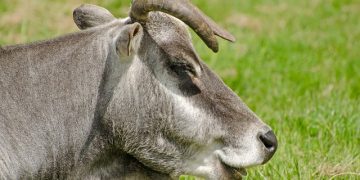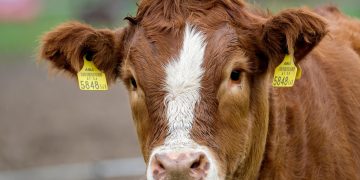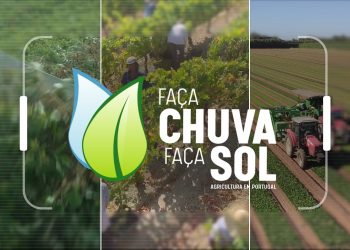Think of wildlife tracking and what probably comes to mind are documentaries following the majestic movements of elephants through the savannah, the graceful migrations of sea turtles in the deep blue and the prowling of big cats in dense jungles.
Yet, in the grand tapestry of nature, one creature that’s vital to the ecosystem but less in the spotlight can be found gently toiling away: the humble bee. Researchers are keeping a watchful eye on these buzzing wonders in a unique effort to understand their behaviour and ensure their survival.
Big buzz
Bees pollinate 80% of all flowering plants, including more than 130 types of fruits and vegetables. Unsung heroes of the natural world, bees and other pollinators are responsible for up to €550 billion a year in global food production.
‘We need to understand better how bees move and pollinate plants,’ said Dr Mathieu Lihoreau, a behavioural ecologist at the University of Toulouse.
Cut to a farm outside Toulouse, the southern French city better known as the location of bigger winged objects: Airbus planes.
But this is no ordinary farm. It’s an experimental site with, for example, no real flowers. Bumblebees and honeybees will be released into the fields – spread over 25 hectares – and tracked while flying to robotic flowers to taste a sugary reward.
The experiment is part of a research project that received EU funding to improve understanding of how bees forage and interact. Lihoreau leads the project, which is called BEE-MOVE and runs for five years until the end of September 2026.
He will trace dozens of bees simultaneously with a radar as they navigate around hundreds of robo-flowers set out in the fields. Knowing why bees buzz off in a certain direction can help improve crop pollination, conserve wild bee populations and save some rare plant species.
Captivating creatures
While Lihoreau has always been fascinated by animal behaviour, as a student he pictured himself observing whales in the Pacific Ocean or primates in African jungles. But then as a young scientist he became captivated by much smaller creatures after joining a laboratory that studied ants.
“Bees are in danger because they forage on plants that we treat with pesticides.
His attention now is on how bees navigate and make decisions as they seek nectar and pollen, orienting themselves using the sun, landscape features and even other bees. Because they collect food for themselves and harvest nectar and pollen for their colony, bees memorise the landscape.
Research suggests bees can even have emotions and doubts, detect electric fields and count.
‘I’m fascinated by them,’ Lihoreau said.
In total, there are around 20 000 bee species and wild bees are critical for a healthy ecosystem. They’re vital assistants in the reproduction of plants by carrying pollen from one flower to another.
Previously, researchers used large and expensive harmonic radars to track an antenna placed on the back of an individual bee. This allowed scientists to follow the bee as it weaved its way around a meadow, searching for flowers before returning home.
But following just one bee gives merely a sliver of insight into what’s going on. Honeybees live in hives of thousands of worker bees and bumblebees reside in nests with dozens or hundreds.
How bees act as a team or make efficient foraging decisions in the company of other pollinators are open questions.
Radar tracking
The BEE-MOVE radar will do its tracking without any of the bees having antennas. It uses the same technology as reversing sensors on cars, sending out energy waves to detect objects by bouncing off them.
Lihoreau said that, to his knowledge, this is the first time such a radar has been used in ecology.
‘I want to show bees do not move randomly in the environment and to understand the rules that guide their sophisticated foraging,’ he said.
The radar will track honeybees and bumblebees separately as they fly to the robo-flowers and then together. The planned robotic plants are small metal containers that recognise individual tagged bees as they alight on a platform and allow them in to sup sugar water.
Eventually, Lihoreau wants to investigate the effect on bee behaviour of adding contaminants like pesticides to the sugar water.
Pesticide threats
Pesticides, including insecticides, used against pests like aphids are often neurotoxins.
‘Bees are in danger because they forage on plants that we treat with pesticides and then they feed on neurotoxins,’ said Lihoreau.
You get metrics that show you how productive the beehives are for pollination.
The European Food Safety Authority said in 2018 that neonicotinoid insecticides pose a threat to wild bees and honeybees. Neonicotinoids are suspected of scrambling the bees’ navigation systems.
Everything that bees learn when navigating a meadow, garden or cityscape is retained. This may ultimately leave them particularly vulnerable to neurotoxins.
‘Because they have this tiny brain, probably every neuron is important,’ said Lihoreau.
In agriculture, healthy bees are crucial for good yields in crops such as strawberries and almonds.
‘Orchards hire beekeepers to bring in hives, but they need numerous healthy bees,’ said Dr Joao Encarnacao, a sensor expert at Irideon, a technology company in the Spanish city of Barcelona.
Hive sensors
If a hive is unhealthy, it can’t pollinate enough flowers and the fruit crop is reduced. But a farmer will become aware of a shortfall in pollinators only when it’s too late.
Encarnacao leads an EU-funded project – iPollinate – positioning sensors on hives to report real-time foraging of honeybees. The tracking technique relies on artificial intelligence and multiple coin-sized sensors placed on the hive.
The information can be used by an orchard owner to spotlight the healthiest bee colonies or to learn the best locations for hives.
‘You get metrics that show you how productive the beehives are for pollination,’ said Encarnacao. ‘So far, nobody has enough information to know how to optimise things like the placement or the orientation of beehives, yet this might be the difference between having good pollination and bad.’
The project, which is due to end in December 2023 after three years, aims by then to have built a prototype of the sensor system. The plan is for the service to be available to commercial partners of the project in 2024.
The sensors have been tested in onion seeds in France and Israel, in berry fruit in countries including France, Spain and Portugal and in almonds and sunflowers in the US state of California.
Californian almonds are a key target for iPollinate because about 2.5 million beehives are routinely set out across more than 500 000 hectares of almond groves – a big commercial opportunity for anybody who can improve pollination and, by extension, the harvest.
Both iPollinate and BEE-MOVE highlight the crucial links between bees and the ecosystem as a whole, reinforcing the need to tackle biodiversity loss driven by human influences including pollution.
‘Bees are on the frontline of an ecological crisis,’ said Lihoreau of BEE-MOVE.
Research in this article was funded by the EU via the European Research Council (ERC). The views of the interviewees don’t necessarily reflect those of the European Commission. If you liked this article, please consider sharing it on social media.
Watch the video
O artigo foi publicado originalmente em Horizon, the EU Research and Innovation Magazine.




















































